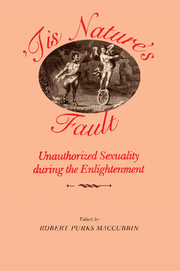Book contents
- Frontmatter
- Contents
- Introduction
- “The Secrets of Generation Display'd”: Aristotle's Master-piece in Eighteenth-Century England
- Sexual Imagination as Revealed in the Traité des superstitions of Abbé Jean-Baptiste Thiers
- Married but not Churched: Plebeian Sexual Relations and Marital Nonconformity in Eighteenth-Century Britain
- Moral Values in “La Suite de l'Entretien”
- Prostitution and Reform in Eighteenth-Century England
- The Properties of Libertinism
- Between the Licit and the Illicit: the Sexuality of the King
- The Sublimations of a Fetishist: Restif de la Bretonne (1734-1806)
- Sodomitical Subcultures, Sodomitical Roles, and the Gender Revolution of the Eighteenth Century: The Recent Historiography
- The Priest, the Philosopher, and Homosexuality in Enlightenment France
- The Pursuit of Homosexuality in the Eighteenth Century: “Utterly Confused Category” and/or Rich Repository?
- Sodomy in the Dutch Republic during the Eighteenth Century
- Parisian Homosexuals Create a Lifestyle, 1700-1750: The Police Archives
- The Censor Censured: Expurgating Memoirs of a Woman of Pleasure
- Chthonic and Pelagic Metaphorization in Eighteenth-Century English Erotica
- Modes of Discourse and the Language of Sexual Reference in Eighteenth-Century French Fiction
- The Mélange de poésies diverses (1781) and the Diffusion of Manuscript Pornography in Eighteenth-Century France
- Obscene Literature in Eighteenth-Century Italy: an Historical and Bibliographical Note
The Properties of Libertinism
Published online by Cambridge University Press: 06 July 2010
- Frontmatter
- Contents
- Introduction
- “The Secrets of Generation Display'd”: Aristotle's Master-piece in Eighteenth-Century England
- Sexual Imagination as Revealed in the Traité des superstitions of Abbé Jean-Baptiste Thiers
- Married but not Churched: Plebeian Sexual Relations and Marital Nonconformity in Eighteenth-Century Britain
- Moral Values in “La Suite de l'Entretien”
- Prostitution and Reform in Eighteenth-Century England
- The Properties of Libertinism
- Between the Licit and the Illicit: the Sexuality of the King
- The Sublimations of a Fetishist: Restif de la Bretonne (1734-1806)
- Sodomitical Subcultures, Sodomitical Roles, and the Gender Revolution of the Eighteenth Century: The Recent Historiography
- The Priest, the Philosopher, and Homosexuality in Enlightenment France
- The Pursuit of Homosexuality in the Eighteenth Century: “Utterly Confused Category” and/or Rich Repository?
- Sodomy in the Dutch Republic during the Eighteenth Century
- Parisian Homosexuals Create a Lifestyle, 1700-1750: The Police Archives
- The Censor Censured: Expurgating Memoirs of a Woman of Pleasure
- Chthonic and Pelagic Metaphorization in Eighteenth-Century English Erotica
- Modes of Discourse and the Language of Sexual Reference in Eighteenth-Century French Fiction
- The Mélange de poésies diverses (1781) and the Diffusion of Manuscript Pornography in Eighteenth-Century France
- Obscene Literature in Eighteenth-Century Italy: an Historical and Bibliographical Note
Summary
Thus are wickedness and libertinism called a knowledge of the world, a knowledge of human nature.
Sir Charles Grandison (2:17)Should we abandon the term “libertinism”? Scholarly usage varies so widely that we begin to doubt whether there ever was a single libertine movement or attitude; anachronism, imprecision, and ambiguity further erode our confidence in the term. Nevertheless, because the concept of libertinism is clearly central to a discussion of illicit sexuality in the eighteenth century, we ought to sharpen our sense of what is involved in using it. This essay will explore some of the semantic inconsistencies of both modern and eighteenth-century usage, and then gather materials for the larger question: how can we construct a history of libertinism?
Apart from denoting some combination of irreligion and sexual rampancy, libertinism appears to be a nebulous concept defined by the interests of the individual scholar. The major French and Italian historians of libertinism confine themselves to the first half of the seventeenth century, placing les derniers libertins in the reign of Louis XIV; and their focus is on the defiance of organized religion rather than on illicit sexuality. French dix-huitièmistes, in contrast, normally apply “libertinisme” and “libertinage” to the erotic fiction of the Régence and to the sexual activities of literary characters, notably in Laclos and Sade. The most thorough German study of libertinism confines itself to France in the sixteenth and seventeenth centuries, and accords only a small role to literary texts, whereas English scholarship tends to apply the term to literature, frequently narrowing the period to the later seventeenth century.
- Type
- Chapter
- Information
- 'Tis Nature's FaultUnauthorized Sexuality during the Enlightenment, pp. 75 - 87Publisher: Cambridge University PressPrint publication year: 1988
- 14
- Cited by



